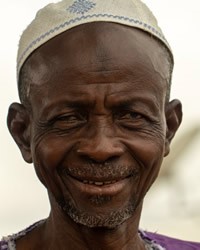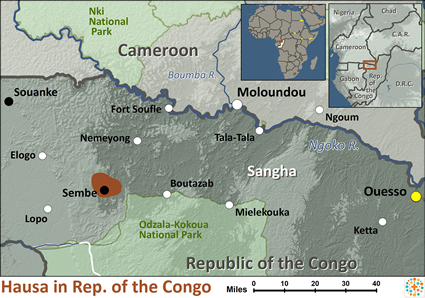By 1500, Islam had been introduced to the Hausa by traders. Many of the urban Hausa embraced it right away, in hopes of enhancing their businesses. However, the villagers were not receptive to this new religion.
In the "holy wars" of 1804 and 1808, the Hausa were conquered by the Fulani, their strongly Islamic neighbors. They were made slaves until the early 1900s. At that time, many of the villagers were either forced or bribed into becoming Muslim. They adopted some of Islam's basic outward behaviors and rituals but did not "sell out" as many of the urban Hausa did. For that reason, many of the rural Hausa today are only superficially Muslim.
Some have wrongly assumed that Boko Haram comes from the Hausa because the term itself is from the Hausa language. But Boko Haram is mainly from Kanuri and Fulani as well as other tribes.
The Hausa are the largest ethnic group in West Africa. Thirty percent of all Hausa can be found in the north and northwest regions of Nigeria, an area known as "Hausaland." Hausa communities can also be found in other West African nations such as Chad, Ghana, the Ivory Coast, Togo, Benin, Gabon, Equatorial Guinea. A small number live as far east as the Republic of the Congo.
Today members of the Hausa community are highly trained, educated and assimilated into the political and social life. Some of the Hausas have become very rich. They are deeply involved in the politics of their communities.
Hausa buildings are characterized by the use of dry mud bricks in cubic structures, multi-storied buildings for the social elite, the use of parapets related to their military/fortress building past, and traditional white stucco and plaster for house fronts. At times the facades may be decorated with various abstract relief designs, sometimes painted in vivid colors to convey information about the occupant.
The Hausa culture is strongly linked to Islam, which makes it difficult to reach this people group with the gospel. There has been intense persecution of the Christian Hausa.
Because Islam has been carried throughout West Africa by Hausa traders and priests, nearly everyone expects a Hausa to be Muslim. This could be one of the main reasons why the Hausa stay so resistant to the gospel and have difficulty leaving their Islamic faith.
Adequate Christian resources are available in the Hausa language, but they are still an unreached Muslim people group. The Hausa people need to see their critical need for the Savior, who loves them and desires a personal relationship with them. They need to see past their worldly success and see that they will not be accepted by the creator of the universe except through his son, Jesus.
Pray that the Holy Spirit will allow circumstances into the lives of Hausa people in Congo that will point to their sinfulness and their need for the Savior.
Pray that they will see that their Islamic religion is not working.
Pray that there will soon be a Disciple Making Movement among Hausa in Congo people that will spread throughout Africa.
Scripture Prayers for the Hausa in Congo, Republic of the.
https://www.britannica.com/topic/Hausa
https://en.wikipedia.org/wiki/Hausa_people
http://www.everyculture.com/wc/Mauritania-to-Nigeria/Hausa.html
| Profile Source: Joshua Project |


























